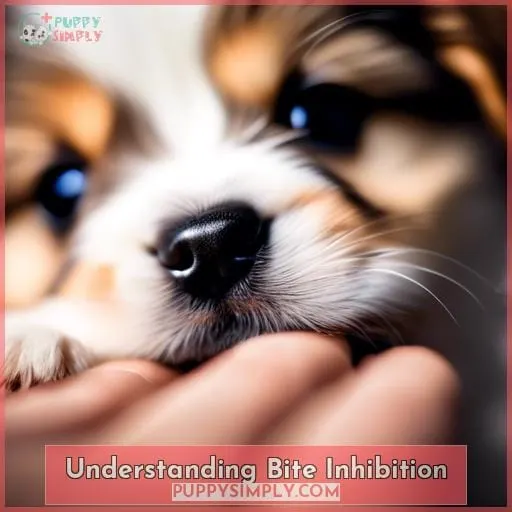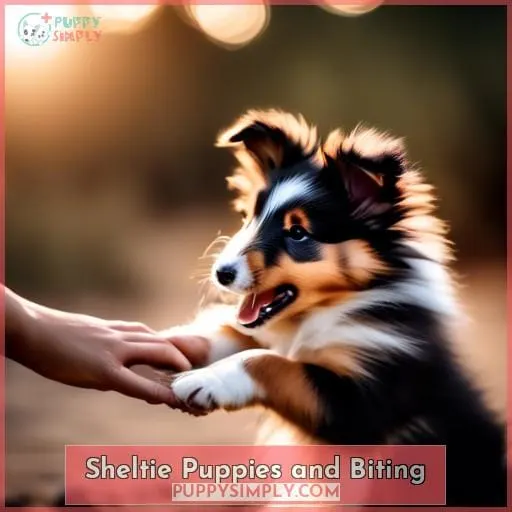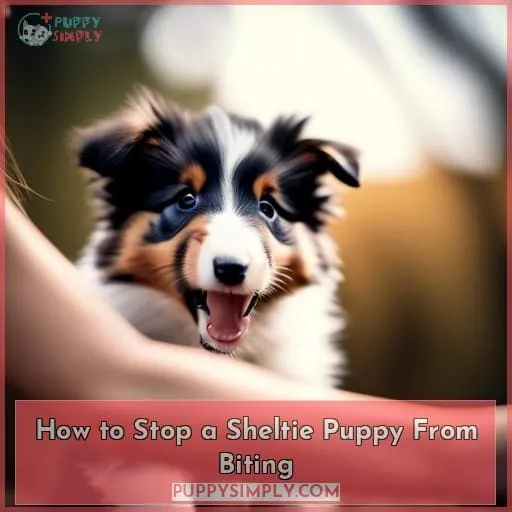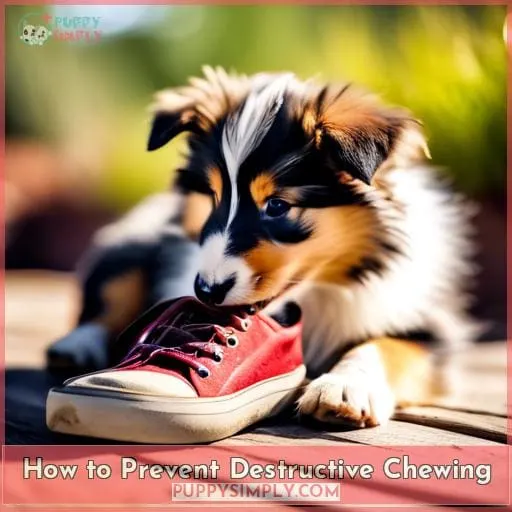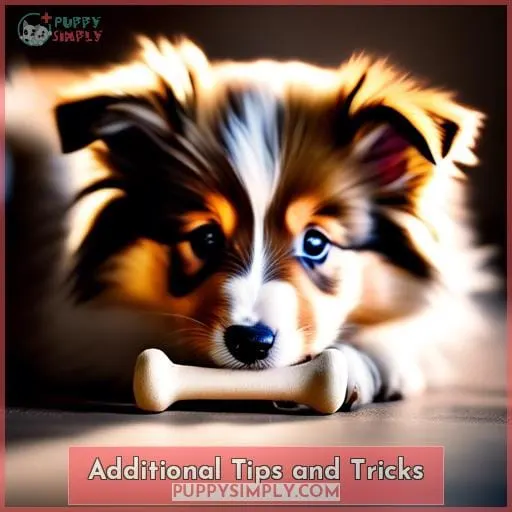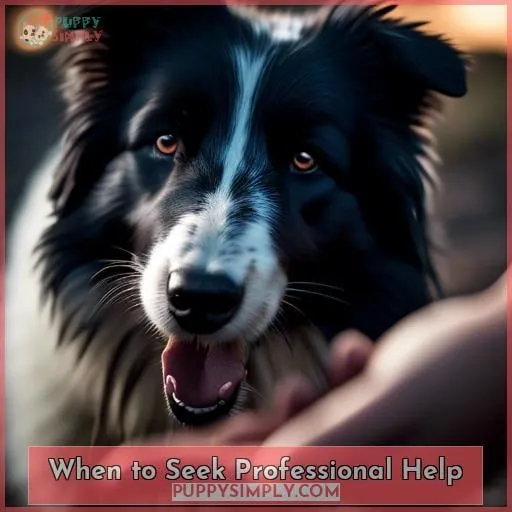This site is supported by our readers. We may earn a commission, at no cost to you, if you purchase through links.

However, they can also be prone to biting, especially as puppies.
This article will help you understand why Shelties bite and provide tips and tricks to help you stop your puppy from biting.
We’ll cover everything from positive reinforcement to using bitter apple spray and more.
We’ll also discuss how to prevent destructive chewing and how to train your Sheltie to curb biting behavior.
Table Of Contents
- Key Takeaways
- Why Do Shetland Sheepdogs Bite?
- Understanding Bite Inhibition
- Sheltie Puppies and Biting
- When Do Sheltie Puppies Stop Biting?
- How to Stop a Sheltie Puppy From Biting
- How to Prevent Destructive Chewing
- Training Your Sheltie
- Additional Tips and Tricks
- When to Seek Professional Help
- Frequently Asked Questions (FAQs)
- What behavior should I expect from a Shetland Sheepdog puppy during play?
- What are some unique characteristics of Blue Merle Shelties?
- What are some common reasons why Shelties may develop destructive chewing habits?
- How can I ensure that my Shetland Sheepdog is properly socialized and comfortable around people and other animals?
- What are some signs that I should seek professional help for my Sheltie’s biting behavior?
- Conclusion
Key Takeaways
- Teething, playfulness, and attention-seeking behavior can cause biting in Sheltie puppies.
- Positive reinforcement, bitter apple spray, and the Ouch! command can help stop nipping behavior.
- Providing safe chew toys and dog-proofing the home can prevent destructive chewing.
- Basic obedience training, socialization, and advanced training classes can help address nipping and promote good behavior.
Why Do Shetland Sheepdogs Bite?
You might wonder why your Sheltie puppy is biting. It’s important to understand the reasons behind this behavior.
Shelties are descendants of shepherds, inheriting a herding instinct that involves nipping at heels to control livestock. This instinct can manifest as play biting in puppies, a natural way to explore their surroundings and communicate with you.
Teething can also cause discomfort, leading them to chew on objects to relieve pain.
Additionally, Sheltie puppies are known for their playfulness, and nipping can be a way for them to engage with you and other dogs.
Understanding these reasons can help you address the behavior effectively.
Understanding Bite Inhibition
Continuing from the natural biting behavior of puppies, bite inhibition is the process by which they learn to control the strength of their bites.
This crucial skill is primarily taught by littermates through a series of yelps and growls during playtime.
When a puppy bites too hard, its sibling yelps in pain, teaching the biter that its bite was too strong.
Sadly, puppies taken away from their litter too early may miss out on these social lessons, potentially retaining the tendency to nip during play and when emotionally distressed as adults.
Understanding bite inhibition is vital in curbing nipping behavior in Shetland Sheepdogs.
By recognizing the natural process and potential setbacks, you can effectively address nipping issues and help your Sheltie puppy develop appropriate biting habits.
Instead, focus on positive reinforcement and humane techniques to teach your puppy bite inhibition and prevent future biting problems.
Sheltie Puppies and Biting
Now that you understand bite inhibition, let’s delve into the specifics of Sheltie puppies and their biting habits.
Sheltie puppies are known for their playful and energetic nature, but their sharp puppy teeth can quickly turn playtime into a painful experience.
Understanding the reasons behind their biting behavior and employing effective training techniques will help you curb this unwanted behavior.
- Teething: Teething is a common trigger for biting in puppies. Provide safe chew toys to alleviate their discomfort and redirect their chewing behavior.
- Playtime Excitement: Puppies often get carried away during play and may nip or bite out of excitement. Teach them to play gently and redirect their attention to appropriate toys.
- Attention-Seeking: Sometimes, puppies bite to get your attention. Avoid rewarding this behavior by giving them attention when they bite. Instead, ignore them and redirect their attention to something else.
- Fear or Anxiety: If your puppy is biting out of fear or anxiety, it’s crucial to address the underlying cause. Socialization and positive reinforcement can help build their confidence and reduce their anxiety.
- Lack of Training: Puppies need proper training to learn acceptable behavior. Enroll your puppy in puppy training classes or work with a qualified dog trainer to teach them basic commands and appropriate behavior.
When Do Sheltie Puppies Stop Biting?
With patience, consistency, and positive reinforcement, you can help your Sheltie puppy learn bite inhibition and stop nipping.
Typically, puppies start showing signs of bite inhibition around weaning age, influenced by their littermates.
However, some Shelties may continue nipping beyond puppyhood due to their herding instinct or underlying anxiety.
If your Sheltie’s nipping persists despite your efforts at behavior modification, consider seeking professional help from a qualified dog trainer or behaviorist.
How to Stop a Sheltie Puppy From Biting
To stop your Sheltie puppy from biting:
- Use positive reinforcement to reward good behavior and discourage nipping.
- Use a bitter apple spray or offer chew toys to redirect the puppy’s attention away from biting.
- Use the Ouch! command to startle the puppy and make it associate biting with an unpleasant experience.
1. Use Positive Reinforcement
Using positive reinforcement when your Sheltie puppy bites is a great way to teach them what’s acceptable.
When your pup nips, give them a firm No! and immediately redirect their attention to a chew toy.
Offer praise and treats when they chew on the toy instead of your hand.
This positive reinforcement will help them learn that biting isn’t okay, while also providing an outlet for their natural chewing instinct.
2. Use a Bitter Apple Spray
How about a bitter apple spray to deter your Sheltie puppy from biting?
Spritz it on furniture legs, shoes, and other off-limit items. Its bitter taste creates an aversion to chewing.
Apply it directly to your skin if your pup nips at you during playtime.
You can make a homemade alternative using vinegar and water, but test it on a small area first.
3. Offer Chew Toys
Offer your Sheltie puppy a few chew toys that are safe and appealing to satisfy its natural chewing instincts.
Ensure the chew toys are made from durable materials and aren’t small enough to be swallowed.
Rotate the toys regularly to keep your puppy interested.
You can also make chew toys more appealing by soaking them in broth or smearing them with peanut butter.
By providing your puppy with appropriate chew toys, you can teach it to chew on acceptable items and redirect its chewing behavior away from your belongings.
4. Use the Ouch Command
When your Sheltie pup nips you, yelp loudly like a hurt puppy to startle them.
This ouch command mimics the cry of a littermate, reminding them of bite inhibition.
Consistency is key – always yelp when they nip, and they’ll soon associate nipping with an unpleasant consequence.
5. Use Time-Outs
Implementing time-outs effectively discourages your Sheltie puppy from nipping.
For instance, if your puppy nips, firmly say No! and immediately place them in a designated time-out area, like a crate or a quiet room, for a short duration, such as 30 seconds to a minute.
Consistency in training is key.
After the time-out, redirect your puppy’s attention to an alternative chew toy.
How to Prevent Destructive Chewing
Shelties may chew furniture or shoes when bored or anxious.
Dog-proof your home to prevent access to chewable items.
Provide safe chew toys to satisfy their urge to chew.
Ensure regular exercise and mental stimulation to keep your Sheltie happy and occupied.
1. Dog-Proof Your Home
concepts
2. Provide Safe Chew Toys
In addition to dog-proofing your home, supplying your Sheltie with a variety of safe chew toys will keep their teeth busy and deter them from chewing inappropriate items.
Offer an array of chew toys with varying textures and flavors to keep your Sheltie engaged.
Rotate toys regularly to maintain their interest.
Choose durable toys that can withstand aggressive chewing and avoid toys with small parts that can be swallowed.
3. Regular Exercise
Regular exercise can keep your Sheltie from destructive chewing.
A tired dog is a content dog, less likely to seek entertainment by gnawing on your furniture.
Aim for at least 30 minutes of moderate exercise daily, whether it’s a brisk walk, a game of fetch, or a swim.
This not only deters chewing but also strengthens the bond between you and your furry friend.
4. Mental Stimulation
With puzzle toys and engaging games, you can stimulate your Sheltie’s mind and curb destructive chewing.
Herding games, fetch, and hide-and-seek satisfy their natural instincts and prevent boredom.
Interactive toys like treat-dispensing balls and puzzle feeders challenge their minds and keep them occupied.
Rotate toys regularly to maintain their interest and prevent boredom.
Mental stimulation is key to a happy and well-behaved Sheltie.
Training Your Sheltie
Start training your Sheltie early, utilizing positive reinforcement and gentle methods.
Socialize your puppy with people and other animals to help them develop good manners and reduce nipping.
Consider enrolling your Sheltie in advanced training classes to further refine their obedience and curb any remaining nipping behavior.
1. Basic Obedience Training
Why not start with basic obedience training to teach your Sheltie proper behavior and curb their nipping habit?
With a steady voice and light hand, you’ll find your Sheltie exceptionally bright and attentive, responding well to praise and food rewards.
2. Socialization
Socializing your Sheltie early on is crucial for preventing shy or suspicious behavior.
Ensure regular exposure to people, animals, and new environments.
Enroll your Sheltie in puppy socialization classes and take them on walks to familiarize them with various sights and sounds.
This will help them become well-rounded and confident dogs.
3. Advanced Training
Once your Sheltie puppy has mastered basic obedience, you can challenge them with advanced training classes.
These classes can teach your puppy valuable skills like:
- Agility
- Herding
- Tricks
Advanced training can also help to socialize your puppy and teach them how to behave in different situations.
- Agility:
- Agility training is a great way to keep your Sheltie puppy active and engaged.
- It also helps to improve their coordination and balance.
- Herding:
- Herding is a natural instinct for Shelties.
- Herding classes can help your puppy to develop this instinct and learn how to control livestock.
- Tricks:
- Tricks are a fun way to bond with your Sheltie puppy and show off their intelligence.
- You can teach your puppy tricks like sit, stay, come, and shake.
- Socialization:
- Socialization is important for all puppies, but it’s especially important for Shelties.
- Socialization classes can help your puppy to learn how to interact with other dogs and people.
Additional Tips and Tricks
You can curb puppy nipping by:
- Exercising your Sheltie daily.
- Socializing it early.
- Providing mental stimulation.
Be patient and consistent with your training, and your Sheltie will eventually stop biting.
1. Exercise Your Sheltie Daily
Give your Sheltie daily exercise through walks, runs, or games of fetch to tire them out and curb their chewing and nipping tendencies.
Exercise helps burn off excess energy, promotes good behavior, and strengthens the bond between you and your furry friend.
Aim for at least 30 minutes of moderate exercise each day, adjusting the intensity and duration based on your Sheltie’s age, health, and energy level.
2. Socialize Your Sheltie Early
Start socializing your Sheltie puppy by introducing them to various people, animals, and environments in a positive and controlled manner.
This will help them learn how to behave appropriately in different situations and reduce the likelihood of biting out of fear or anxiety.
Enroll your pup in puppy socialization classes, take them on outings to the park or pet store, and invite friends and family to meet them.
The more positive experiences your Sheltie has, the less likely they are to bite.
3. Provide Mental Stimulation
With your Sheltie’s energy in check, engaging their mind through mental stimulation is vital for curbing nipping.
Engage them with puzzles designed for their breed, like treat-dispensing toys or snuffle mats.
Hide treats around the house for them to find, turning mealtime into a treasure hunt.
Interactive toys that require problem-solving skills are also great options.
Arrange playdates with other dogs to provide social and mental stimulation.
These activities will keep your Sheltie occupied and less likely to resort to nipping out of boredom.
4. Be Patient and Consistent
Be patient and consistent with your pup’s training, as it may take several weeks or even months for them to fully understand and follow your commands.
Time-outs are effective when used consistently, but try not to overdo them, as a loud noise or a firm no can be just as effective.
If time-outs aren’t working, try offering your puppy an alternative, like a chew toy, instead.
When to Seek Professional Help
Sometimes, despite your best efforts, your Sheltie puppy’s biting behavior may persist. This is especially true if your puppy has experienced trauma, neglect, or abuse in its early life.
If you’ve tried the tips and tricks in this article and your puppy is still biting, it’s time to seek professional help.
A qualified dog trainer or behaviorist can help you:
- Identify the root cause of your puppy’s aggression and develop a personalized training plan to address it.
- Learn how to communicate with your puppy more effectively and manage its anxiety or fear.
- Puppy aggression: An experienced trainer can help you identify the triggers for your puppy’s aggression and develop strategies to manage it.
- Fear of punishment: A trainer can help you create a positive and fear-free training environment, which is essential for stopping biting behavior.
- Anxiety in puppies: If your puppy’s biting is caused by anxiety, a trainer can help you identify the source of the anxiety and develop coping mechanisms.
Frequently Asked Questions (FAQs)
What behavior should I expect from a Shetland Sheepdog puppy during play?
During play, expect your Shetland Sheepdog puppy to mouth and nip as a natural way to explore and communicate.
This behavior is typically harmless, but training is necessary.
Teach bite inhibition and acceptable play boundaries.
What are some unique characteristics of Blue Merle Shelties?
Blue Merle Shelties, a mesmerizing sight,
Don their coats like a starry night.
Their piercing eyes,
A window to their intelligence,
Command respect and admiration.
Yet, beneath their regal demeanor
Lies a playful spirit,
Eager to frolic and charm.
What are some common reasons why Shelties may develop destructive chewing habits?
Shelties may develop destructive chewing habits due to boredom, anxiety, or a lack of appropriate chew toys.
Ensure your Sheltie gets enough exercise and mental stimulation.
Provide them with a variety of safe and appealing chew options.
How can I ensure that my Shetland Sheepdog is properly socialized and comfortable around people and other animals?
Patience is the key to unlocking a Sheltie’s comfort around others.
Gentle, consistent exposure to people and animals will help them flourish into well-rounded, confident companions.
What are some signs that I should seek professional help for my Sheltie’s biting behavior?
If your Sheltie’s biting persists despite consistent training and positive reinforcement, seeking professional help from a qualified dog behaviorist or trainer is advisable.
They can assess the underlying cause and create a personalized plan to address the issue effectively.
Conclusion
Shetland sheepdogs, or Shelties, are like tiny whirlwinds of energy, capable of bringing immense joy and occasional nips.
If your Sheltie puppy’s teeth have become a bit too sharp, know that this biting behavior won’t last forever.
With patience, consistency, and the right approach, you can help your furry friend learn to curb their biting and develop into a well-behaved companion.


